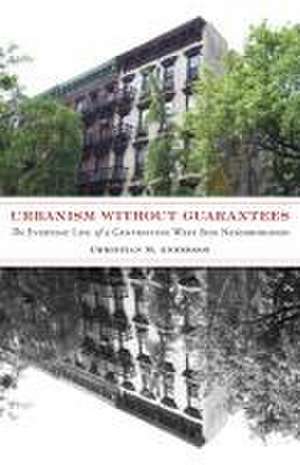Urbanism without Guarantees: The Everyday Life of a Gentrifying West Side Neighborhood: Diverse Economies and Livable Worlds
Autor Christian M. Andersonen Limba Engleză Hardback – 24 mar 2020
A unique more-than-capitalist take on urban dynamics
Vigilante action. Renegades. Human intrigue and the future at stake in New York City. In Urbanism without Guarantees, Christian M. Anderson offers a new perspective on urban dynamics and urban structural inequality based on an intimate ethnography of on-the-ground gentrification.
The book is centered on ethnographic work undertaken on a single street in Clinton/Hell’s Kitchen in New York City—once a site of disinvestment, but now rapidly gentrifying. Anderson examines the everyday strategies of residents to preserve the quality of life of their neighborhood and to define and maintain their values of urban living—from picking up litter and reporting minor concerns on the 311 hotline to hiring a private security firm to monitor the local public park. Anderson demonstrates how processes such as investment and gentrification are constructed out of the collective actions of ordinary people, and challenges prevalent understandings of how place-based civic actions connect with dominant forms of political economy and repressive governance in urban space.
Examining how residents are pulled into these systems of gentrification, Anderson proposes new ways to think and act critically and organize for transformation of a place—in actions that local residents can start to do wherever they are.
Vigilante action. Renegades. Human intrigue and the future at stake in New York City. In Urbanism without Guarantees, Christian M. Anderson offers a new perspective on urban dynamics and urban structural inequality based on an intimate ethnography of on-the-ground gentrification.
The book is centered on ethnographic work undertaken on a single street in Clinton/Hell’s Kitchen in New York City—once a site of disinvestment, but now rapidly gentrifying. Anderson examines the everyday strategies of residents to preserve the quality of life of their neighborhood and to define and maintain their values of urban living—from picking up litter and reporting minor concerns on the 311 hotline to hiring a private security firm to monitor the local public park. Anderson demonstrates how processes such as investment and gentrification are constructed out of the collective actions of ordinary people, and challenges prevalent understandings of how place-based civic actions connect with dominant forms of political economy and repressive governance in urban space.
Examining how residents are pulled into these systems of gentrification, Anderson proposes new ways to think and act critically and organize for transformation of a place—in actions that local residents can start to do wherever they are.
Preț: 495.52 lei
Nou
Puncte Express: 743
Preț estimativ în valută:
94.90€ • 97.78$ • 79.50£
94.90€ • 97.78$ • 79.50£
Carte disponibilă
Livrare economică 03-17 februarie
Livrare express 17-23 ianuarie pentru 36.37 lei
Preluare comenzi: 021 569.72.76
Specificații
ISBN-13: 9781517907419
ISBN-10: 1517907411
Pagini: 312
Ilustrații: 10
Dimensiuni: 140 x 216 x 23 mm
Greutate: 0.48 kg
Editura: University of Minnesota Press
Colecția Univ Of Minnesota Press
Seria Diverse Economies and Livable Worlds
ISBN-10: 1517907411
Pagini: 312
Ilustrații: 10
Dimensiuni: 140 x 216 x 23 mm
Greutate: 0.48 kg
Editura: University of Minnesota Press
Colecția Univ Of Minnesota Press
Seria Diverse Economies and Livable Worlds
Notă biografică
Christian M. Anderson is associate professor in the School of Interdisciplinary Arts and Sciences at the University of Washington at Bothell.
Cuprins
Contents
Introduction: Situating a Struggle
I. Renovating and Making the Urban Question Critical: Toward a Parallax Urbanism
1. Fateful Leaps: Flipping the Script on Rent Gaps and Revanchism
2. Unsettling the Urban Question
3. The Contingencies of Civic Action, Revisited
4. The Hitch, or, Performative Infrastructure
II. Place-Embedded Stories and Other Incitements to Parallax Urbanism
5. A Brief (Infrastructural?) History of West Forty-Sixth Street
6. Specters, Traditions, and the Dominance of Common Sense
7. Battles, Contradictions, and Good Sense
Conclusion: This Hegemony Is a Drag
Acknowledgments
Notes
Bibliography
Index
Introduction: Situating a Struggle
I. Renovating and Making the Urban Question Critical: Toward a Parallax Urbanism
1. Fateful Leaps: Flipping the Script on Rent Gaps and Revanchism
2. Unsettling the Urban Question
3. The Contingencies of Civic Action, Revisited
4. The Hitch, or, Performative Infrastructure
II. Place-Embedded Stories and Other Incitements to Parallax Urbanism
5. A Brief (Infrastructural?) History of West Forty-Sixth Street
6. Specters, Traditions, and the Dominance of Common Sense
7. Battles, Contradictions, and Good Sense
Conclusion: This Hegemony Is a Drag
Acknowledgments
Notes
Bibliography
Index








